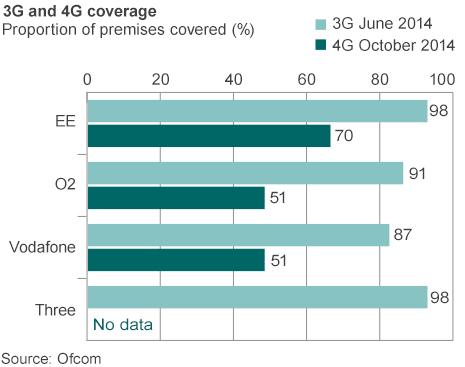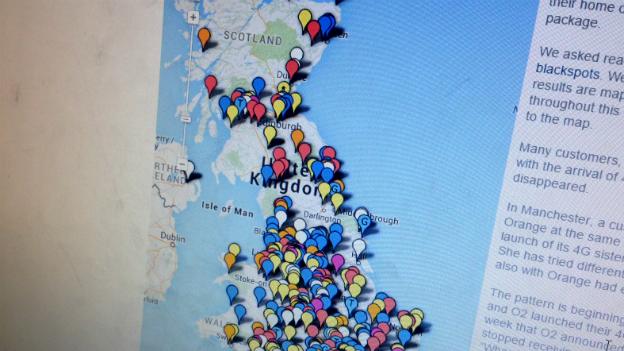UK average 4G speed over 15Mbps, Ofcom report finds
- Published

4G is significantly faster than 3G according to the report
UK 4G speeds are more than twice as fast as 3G, according to a new report from watchdog Ofcom.
They clocked up an average of 15.1Mbps (megabits per second) while 3G averaged 6.1Mbps, it suggested.
The report, external looked at the speed and coverage of mobile networks in five major UK cities - London, Birmingham, Manchester, Glasgow and Edinburgh.
It indicated that London had the fastest 4G web browsing speeds but the slowest 3G browsing speeds.

While it took just 0.72 seconds to load a standard web page on the 4G network in London, it took 1.2 seconds via 3G.
Getting a web page to load on the 4G network took the longest in Glasgow (0.82 seconds) while Manchester had the best 3G browsing speeds (1.01 seconds), according to the report.
Edinburgh recorded the highest download speeds for both 4G and 3G with London having the lowest for both.
It is an indication that the situation regarding the performance of both 4G and 3G is complex and patchy around the country but it does make a good case for the overall performance of 4G, said Ofcom chief executive Ed Richards.
"Today's research shows 4G is providing a significantly enhanced mobile broadband experience to customers, which we expect to be available to 98% of the UK population by 2017 at the latest."
The findings help make the case for consumers who may be considering an upgrade to 4G, thinks Ovum analyst Matthew Howett.
"I expect some consumers might have held off upgrading in the belief that the network performance wouldn't be that much different, or because of a bad 3G experience, but this report clearly highlights the difference, so for operators this is probably a welcome piece of work," he said.
Others pointed out that the report may not be an accurate portrait of 4G across the whole UK.
"Ofcom's latest report shows that 4G speeds are undoubtedly improving, but with the chosen test locations in key urban centres, it's not a real representation of the UK as a whole," said Ernest Doku, telecoms expert at uSwitch.
"The true picture for those based outside of major towns and cities - where it is often needed most - is still uncertain."

The report indicated that speeds varied from operator to operator.
EE and Vodafone delivered the fastest average 3G download speeds at 6.8Mbps and 6.7Mbps respectively, according to the report.
This compared with 3G speeds of 5.6Mbps for O2 and 5.2Mbps for Three.
The 4G speed winner was EE with an average of 18.4Mbps, followed by O2 at 15.6Mbps. Vodafone's average 4G speed was 14.3Mbps and Three's 10.7Mbps, the report found.
Each of the operators attempted to put their own spin on the findings.
Three said it was pleased that "in the areas that matter" - web browsing speeds and latency - it had done well.
Meanwhile Vodafone questioned the results.
"These results were undertaken over six months ago and don't give consumers a full picture as there were only a small number of tests undertaken, in a small number of cities and only taken in places where the majority of operators had coverage," the firm said in a statement.
Coverage promises
The report also looked at how the operators are performing when it comes to coverage. 4G coverage has increased rapidly and Ofcom reports that it is currently available from at least one operator in around 70% of UK premises.
Mobile operators have suggested that they intend to match O2's 98% indoor coverage obligation for 4G mobile services by 2015. This is likely to extend coverage into areas underserved by 3G.
One notable omission from the report is data about Three's 4G coverage. Ofcom cites differences between its data and that of Three's as the reason it was left out.
The research measured the performance of 4G and 3G on smartphones, both indoors and outdoors across the five cities between March and June 2014.
It looked at upload and download speeds, web browsing speeds and latency - the time it takes data to travel to a third-party server, important to reduce delays when making video calls, for example.
- Published5 November 2014

- Published3 November 2014

- Published5 November 2014
